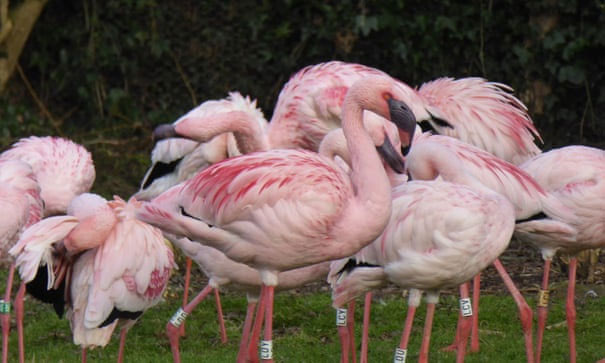New finding: Dark flamingos are aggressive and often gain food
The scientists found that the flamingos with dark pink feathers were the most aggressive when scrambled for food.
According to the Guardian, the latest research from the University of Exeter, the UK shows that bright pink fur is a sign that flamingos are in good health and that they will be more aggressive when fighting for food.
"Flamingos live in crowded flocks with complex social structures, and colors play an important role in stratification . The coat color is made up of the amount of carotenoids they absorb from food , " said Dr. Paul Rose, a zoologist at Exeter University, and the lead author of the study, said.
"A healthy crane means that they can feed well and their feathers will be darker, and they will have more time and energy to become aggressive when searching for food," said Rose.

The color of the coat is thought to play an important role in the social hierarchy of flamingos. Those with dark coat color will be strong. (Photo: PA).
The team observed the birds in conditions: when they were fed indoors, indoors and outdoors. They found they would compete vigorously indoors, with brightly colored ones becoming more aggressive with lighter ones.
When outdoors, however, flamingos show less attitude. There is no clear difference between males and females in displaying aggressive behavior when fighting for food.
According to the team, this finding suggests that birds living in captivity should be fed in a large space.
"When crowded to find food, they will scramble more and have less time to feed," said Mr. Rose.
Each African flamingo weighs up to 2kg and feeding them outdoors will be extremely difficult, especially in the cold season.
The team also found that flamingos will darken their coat color when ready to mate, and they will revert to their old coat color after reproduction.
Previous studies have shown that flamingo society is quite complex, they have the ability to make long friends and often spend time with these friends, regardless of whether they belong to a larger herd.
- Why are flamingos pink?
- Interesting facts about flamingos
- Shocked with the clip of flamingos pecking at each other's heads for blood, but the real reason is that everyone feels fluttering
- The truth about the flamingo 'married life' together
- Flamingos love more with classical music
- Beautiful photo of flamingos
- Indian flamingos died massively due to electric shock
- The race to find dark matter is heating up
- Detect rare black flamingos
- Chemicals in plastic can cause weight gain
- About the time the flamingos cried when falling back
- If you are aggressive, so is your dog
 Animal 'suffering' after hibernation
Animal 'suffering' after hibernation Why do goats climb well?
Why do goats climb well? Scientists were surprised to see chimpanzees eating turtles
Scientists were surprised to see chimpanzees eating turtles Giant catfish died deadly due to drought in Thailand
Giant catfish died deadly due to drought in Thailand